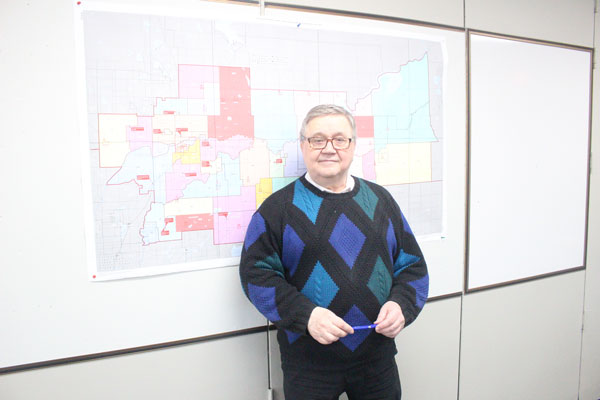
After seven elections as the Returning Officer for the federal constituency of Prince Albert, Barry Hollick retired in late 2023.
After working seven elections for Elections Canada, Hollick said it was time to retire.
However, he also said disagreements with changes made by Elections Canada influenced the decision.
Hollick said he was disappointed that the Prince Albert riding has been declared a remote constituency, like Desnethé—Missinippi—Churchill River to the north. He said that will affect poll worker training, and the candidate nomination process.
“I find people in Ottawa don’t really know the geography that well over here and they then said, ‘well, OK, we’ll make Prince Albert a remote riding,” Hollick said.
Remote ridings like Desnethé—Missinippi—Churchill River require only 50 nominators for a candidate to be nominated, Hollick said. In regular ridings, it takes 100. Remote ridings often have to fly ballots in by plane, he added, which impacts how poll workers are trained.
In past elections, poll workers in Prince Albert were trained by Prince Albert poll workers, while a Rural Trainer covered Melfort, Nipawin, Tisdale, and smaller communities.
With Prince Albert being declared a remote district, Hollick said, the new returning officer will be working other returning officers who have a different set of problems. He said the Prince Albert riding has more in common with areas like Moose Jaw, as opposed to northern
Saskatchewan.
“We get all the city ballots in the night of the election,” Hollick explained. “We have a Courier service where we get all the other ballots the second day. Up north, they’re flying ballots out. Sometimes it takes a week to get a ballot box in.
“For the last two elections I would meet with Northern ridings, and then they would say, OK, let’s do some brainstorming and let’s look at our problems,” Hollick added. “Well, their problems are training remotely and retrieval of ballots, and so my assistant, and I would sit
with these people, and we really didn’t have anything to share.”
Prior to the last two elections, Hollick met with the Saskatchewan group. Now, he said, the returning officer will meet with the northern and remote group despite the riding not belonging there.
Hollick said he’s shared his concerns with Elections Canada, but nothing has changed.
“We’re still there and it doesn’t make sense to us,” he said. “I’m always in contact with other RO’s and they’re telling me that they still use some good ideas that we developed here in Prince Albert.”
Some of the good idea from his term as returning officer was a contingency plan for the riding and the ballot retrieval for rural ridings.
“But, there’s still no change,” Hollick said. “I sat with the Chief electoral officer at a meeting in Saskatoon shared with him the concern about that and. He said he would look into it and nothing has changed to this point.”
Being declared a remote riding was just one of the changes Hollick disagreed with. He also said the Prince Albert office was declared a small office, which decreased the number of computers available for workers.
Hollick said the redrawing of the electoral map also factored into his decision to retire.
During his time as returning officer, Hollick faced a number of challenges, even before COVID hit.
The biggest change came in Melfort, where Hollick said voters in the same household were sometimes being asked to vote in two different locations. He encouraged Elections Canada to have all Melfort voters cast their ballots in the same location, currently the Kerry Vickar
Centre.
Holllick asked for a team of people to correct addressing and Elections Canada agreed to put everyone in one place.
COVID-19 also created challenges during the 2020-21 federal election because they were not
allowed to use schools as voting locations. Instead, Hollick said they had to use hotels and mall spaces that met accessibility requirements.
That wasn’t the only challenge either.
“We had some real difficulties with people who refused to wear masks,” Hollick
remembered. “That was a requirement when you went in to vote, you were supposed to wear a mask, and on two occasions on that election we actually had to call the RCMP in because of threats made (at) two of our rural polls.”
Hollick said that because elderly people often work polls, they were easily intimidated and frightened by the threats.
“But other than that election, the rest were pretty smooth,” he added.
He explained that for an election he would hire 20 office staff but had to hire hundreds of people to work election days and train them. Hiring people was another change as federal parties used to find poll volunteers. He explained that a returning officer can hire about 700
people to work on Election Day.
The Daily Herald contacted Elections Canada for a response to Hollick’s comments and they provided the following statement:
“Elections Canada is not able to provide a comment, here, since changes to electoral districts are done by independent commissions set up in each province. We only implement the changes. The commissions completed their work some time ago, so I do not believe they would
be able to provide a reply.”
michael.oleksyn@paherald.sk.ca

